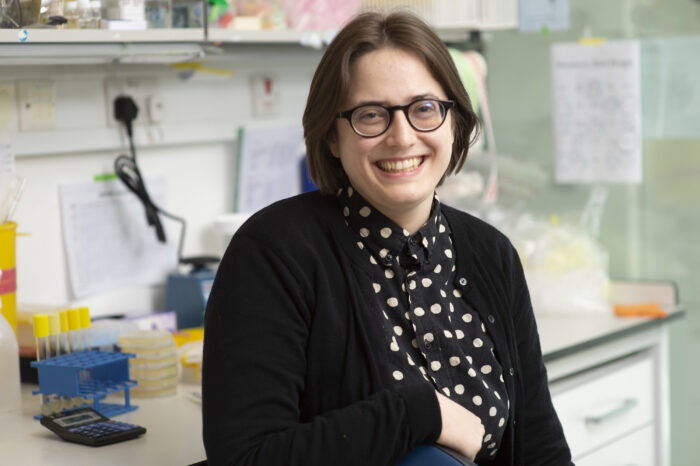Luka Smalinskaite was recognised for her PhD work in Manu Hegde’s group investigating how membrane proteins become embedded into the membrane

Luka Smalinskaite, who is working in Manu Hegde’ s group in the LMB’s Cell Biology Division, has been announced as The Raff Medal Winner 2023 by the British Society for Cell Biology (BSCB). The Medal and Award talk will be given at the 2023 Dynamic Cell V meeting at Loughborough University, from April 17th to 20th.
This award was named after the eminent biologist Professor Martin Raff, who was the president of the BSCB from 1992-1995, and recognises BSCB PhD students who have made outstanding contributions to UK and Ireland Cell Biology. The Raff Medal is open to students who have submitted their PhD thesis no later than 12 months ago and candidates must be nominated by one of their supervisors, or collaborators. Candidates are assessed on the quality and impact of their thesis research, as well as broader community engagement such as conferences, public engagement, community outreach, or scientific advocacy.
Proteins that span the membrane multiple times are critical in physiology. Examples of their possible functions are receptors, which are essential to our senses; and channels or transporters, which allow the passage of substances in and out of the cells. Luka Smalinskaite was recognised for her work investigating how such multipass membrane proteins first become embedded into the membrane. In earlier work, Manu’s group had discovered a previously unknown factor that helps multipass membrane proteins to be made correctly. But what this “chaperone” actually does and why it is important for multipass proteins was unknown. Luka used a biochemical strategy that traps the process of multipass membrane protein production at different stages, then applied several types of methods to these intermediates to make them “visible”.
Luka’s analysis revealed the step when a multipass protein first engages the chaperone, how the chaperone protects the nascent multipass membrane protein, what other factors are recruited to the multipass protein, and how these factors help insert later parts of the multipass protein into the membrane. In a collaboration with Robert Keenan’s group at the University of Chicago in the United States, similar strategies were used to characterise the timing of how all these factors assemble and disassemble during the process of making a multipass membrane protein. Together, the studies define a new step-by-step framework to explain how multipass membrane proteins are initially weaved into a membrane and become embedded there. Most of the ~2500 multipass membrane proteins in the human genome are likely to use this newly discovered pathway for insertion. The papers that came out of this project were published in Nature.
During her PhD Luka participated in the organisation of the International Graduate Student Life Sciences Symposium at the LMB. In addition, she is part of the LMB Safety committee and a certified mental health first aider. Before starting her PhD at the LMB, Luka completed a B.Sc. in Molecular Biotechnology at Heidelberg University and was awarded a Friedrich Ebert scholarship, which allowed her to do an internship at Metrion Biosciences and MPhil degree at Cambridge Institute for Medical Research in David Ron’s lab.
Congratulations, Luka!
Previous Raff Medal winners include Florence Young, PhD student in Simon Bullock’s group.
Further references
Manu Hegde’s group page
BSCB PhD Award – Raff Medal
Pathway for making multipass membrane proteins elucidated
Florence Young is awarded the Raff PhD student Medal from the British Society for Cell Biology